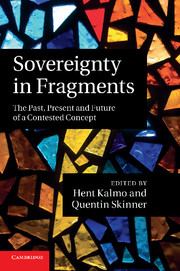Book contents
- Frontmatter
- Contents
- Notes on contributors
- Acknowledgements
- Introduction: a concept in fragments
- 1 The sovereign state: a genealogy
- 2 The apparition of sovereignty
- 3 The Westphalian myth and the idea of external sovereignty
- 4 Double binds: sovereignty and the just war tradition
- 5 The durability of organized hypocrisy
- 6 A matter of fact? The many faces of sovereignty
- 7 The survival of sovereignty
- 8 Sovereignty and after
- 9 Prolegomena to the post-sovereign Rechtsstaat
- 10 Sovereignty beyond the state
- 11 Sovereignty between government, exception and governance
- 12 Conclusion: vocabularies of sovereignty – powers of a paradox
- Bibliography
- Index
5 - The durability of organized hypocrisy
Published online by Cambridge University Press: 04 February 2011
- Frontmatter
- Contents
- Notes on contributors
- Acknowledgements
- Introduction: a concept in fragments
- 1 The sovereign state: a genealogy
- 2 The apparition of sovereignty
- 3 The Westphalian myth and the idea of external sovereignty
- 4 Double binds: sovereignty and the just war tradition
- 5 The durability of organized hypocrisy
- 6 A matter of fact? The many faces of sovereignty
- 7 The survival of sovereignty
- 8 Sovereignty and after
- 9 Prolegomena to the post-sovereign Rechtsstaat
- 10 Sovereignty beyond the state
- 11 Sovereignty between government, exception and governance
- 12 Conclusion: vocabularies of sovereignty – powers of a paradox
- Bibliography
- Index
Summary
Sovereignty has come to provide the dominant logic of appropriateness for organizing political life, despite the fact that logics of consequences often dictate behaviour that is inconsistent with the basic principles of sovereign statehood and expectations of how it is actually practised. This decoupling of logics of appropriateness and logics of consequences, an example of organized hypocrisy, is not a new development. It has always characterized the sovereign state system. Consequential actors have not had an incentive to align more closely dominant principles and actual behaviour. This calculus could, however, change if the core security interests of the most powerful states are threatened in ways that cannot be accommodated within existing sovereign norms. If such threats do become manifest, the decoupling between rules and norms could become even greater, or the rules of the international system might be rewritten. Neither of these outcomes, greater decoupling or new rules, is preferable to the status quo of organized hypocrisy.
The concept of sovereignty embeds two separate and distinct principles and one fundamental assumption about actual practice. The three core elements of sovereignty are:
International legal sovereignty: international recognition which implies the right to enter into contracts or treaties with other states, juridical equality, membership in international organizations.
Westphalian/Vattelian sovereignty: the absence of submission to external authority structures, even structures that states have created using their international legal sovereignty.
Domestic sovereignty: more or less effective control over the territory of the state including the ability to regulate trans-border movements.
- Type
- Chapter
- Information
- Sovereignty in FragmentsThe Past, Present and Future of a Contested Concept, pp. 96 - 113Publisher: Cambridge University PressPrint publication year: 2010
- 11
- Cited by



